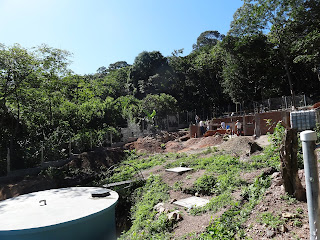The team is currently wrapping up fabrication of two Enclosed Stacked Rapid Sand Filters (EStaRS) with a PVC workshop in Tegucigalpa, and next week the team will travel to San Juan Guarita to begin work on the chemical dosing system. On the social side the team has already narrowed the operators down to 6 final candidates, and there have been several water board meetings to discuss community expectations, plant sustainability, and a new tariff price.
In Las Vegas, the team is expecting to test the 70 L/s plant for the first time within the next two weeks!

This week the team of operators and APP technicians finished installing the entrance and exit modules for each of the four Open Stacked Rapid Sand Filters (OStaRS). On the community level, six incredible operators have been chosen as final candidates, and APP has been holding neighborhood level workshops to create awareness and support for the new AguaClara technology. A chemical engineer was also hired for a full time role with the plant, and he will be in charge of monitoring the dose of HCl that is administered to prevent the formation of Calcium Carbonate in the distribution system.
Two new projects will begin in January, one a 30 L/s plant at the Zamorano Pan-American Agricultural School, and the second a 105 L/s plant in the city of Gracias, the capital of the department of Lempira. It also looks like a plant in La Concordia, Nicaragua is on the horizon early in 2017, and the team will be heading to Guatemala next week to assess the feasibility of a 70 L/s AguaClara plant in Quezaltepeque, Chiquimula. APP is taking steps to prepare for the busy year ahead and has hired an additional technician, and will also hold an internal workshop on Dec 2-3 to discuss best practices for our civil and environmental engineers, architects, plant foreman, and technical support roles. The future certainly looks bright here in Honduras and beyond!















